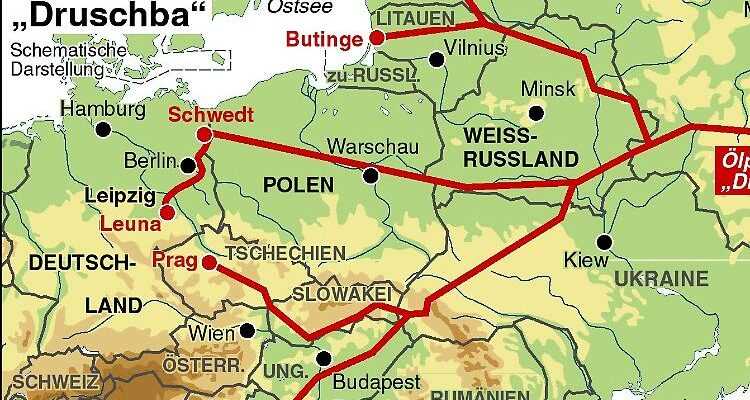Schwedt is on a drip
Oil embargo mainly hits East Germany
05/04/2022, 2:05 p.m
The use of Russian oil in Germany has been cut back sharply since the beginning of the Ukraine war. The dependencies are still very unequally distributed regionally: The refineries in the west are hardly affected. In contrast, the Mitteldeutschland refinery in Leuna, which was previously supplied via the Druzhba pipeline, is only gradually turning its back on Russian oil. And the PCK refinery in Schwedt/Oder is still completely dependent on it for the time being. An EU import ban on Russian crude oil could now take effect in six months. Is East Germany running out of fuel? Are prices going through the roof? Five points that are important now:
East Germany runs on fuel from Leuna and Schwedt
In Berlin and Brandenburg, nine out of ten cars use fuel from the refinery in Schwedt, Brandenburg, according to PCK (formerly: Petrochemicals Combine). BER Airport also obtains kerosene from there. The Leuna refinery in Saxony-Anhalt supplies around 1,300 petrol stations in Saxony-Anhalt, Saxony and Thuringia. In addition, the East German refinery products are a lubricant for the chemical-pharmaceutical industry, which, according to the industry association, employs around 54,500 people in 160 companies. Economics Minister Robert Habeck from the Greens writes in the latest progress report on energy security: “Particularly in East Germany, this process of becoming completely independent of Russian oil is demanding.”
Leuna looks for other sources
The operator of the Leuna refinery, the Totalenergies group, decided in March to stop purchasing Russian oil by the end of the year. “A supply contract with Russian crude oil ended at the end of March,” the company said. “The first cargoes with alternative supply from non-Russian crude oil are currently being unloaded.” You are in the transition phase. The mineral oil association Fuels and Energy confirms: “For the Leuna refinery site, there are signs of continued operation via a pipeline from the seaport of Gdansk, but not to the same extent as before.” Crude oil arrives in tankers from other countries in Gdansk, Poland, and is then transported west via the Plock pipeline. Alternative supplier countries are, for example, Great Britain, Norway, Kazakhstan, Libya, Nigeria and the USA.
Schwedt is a special case – with an uncertain outcome
According to Habeck, the PCK refinery Schwedt has so far had no interest in turning away from Russian oil because of the Russian majority owner Rosneft. The federal government is therefore considering expropriation as a last resort.
According to Fuels und Energie, it would also be possible to supply Schwedt with tanker oil from other countries via a pipeline from the seaport of Rostock – but only in part due to a lack of capacity. “We are currently examining whether this is sufficient for long-term operation,” explains the association. According to a study for Greenpeace, the supply route via Rostock could cover 60 percent of the demand in Schwedt, and up to 90 percent if the pipeline were expanded. For Schwedt, quantities could probably be added via the Gdansk port. Talks are currently underway between the federal government, Brandenburg and Shell Germany as to how the refinery can remain online without Russian oil.
The following applies to both Schwedt and Leuna: The systems are calibrated to the type of Siberian oil previously purchased. They would either have to be readjusted, which would mean a break in production. Or you would have to produce a mixture from new sources that is similar to the Russian oil previously purchased, the industry association explains.
The west will have to (partially) supply the east
Fuels and Energy assumes that both East German refineries can continue to operate at least at partial load without Russian oil. In that case, “the supply of petrol stations nationwide, including eastern Germany, could be maintained”. Finished products such as petrol and heating oil could be transported east from West German refineries via tank wagons, trucks or ships. Bridging aid from the crude oil reserve in Lower Saxony could go via Wilhelmshaven by tanker to Rostock and Gdansk. The Greenpeace study by energy expert Steffen Bukold describes a similar scenario.
It’s going to be expensive
An oil embargo could send out the signal on the world market as a whole: Watch out, scarce goods, prices are high! However, even experts do not dare to predict whether and to what extent this will happen, because factors such as the dollar exchange rate are always involved. Cost factors could also come into play, especially in eastern Germany. The economist Jens Südekum recently explained it like this: Due to a lack of demand, since the beginning of the war Russian crude oil has been significantly cheaper than oil from other sources, which many now want.
Now, especially in East Germany, large quantities have to be replaced at higher prices. In addition, the transport of crude oil and oil products from west to east would cost additional money, as would the conversion of the east German refineries. According to experts, all of this could mean that the prices at the pump in the east are a few cents higher than in the west. On the other hand, fluctuations of a few cents back and forth are daily business for gas station customers anyway.
Source: ntv.de, Verena Schmitt-Roschmann, Burkhard Fraune and Oliver von Riegen, dpa
